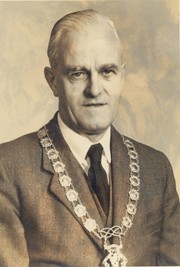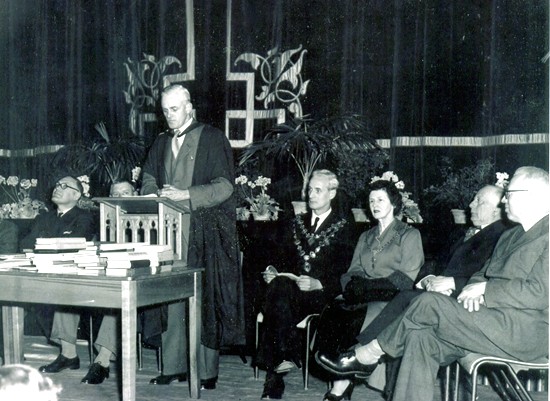|
 |
L R W Day
1900-1989 |
One of the most influential figures
in the field of education in Bourne during the 20th century was L R W Day,
a Cambridge graduate who served not only as a senior master at Bourne
Grammar School but also as headmaster of Bourne Secondary School which was
to become the Robert Manning College.
Leslie Robert William Day was born at Church Gresley, near Swadlincote,
Derbyshire, on 2nd July 1900 and educated at Chesterfield Grammar School,
the first Derbyshire pupil to be awarded a scholarship to a grammar
school. He went on to study at Westminster College, London, from October
1917 until May 1918 but the Great War intervened and in July he joined the
Inns of Court Officer Training Corps, remaining in uniform until February
1919 when he returned to Westminster College where his course was
completed the following year.
He went on to Fitzwilliam Hall, Cambridge, his studies being impossible
without the money he earned as head of the City of Cambridge Evening
Institute, an investment that paid off because he graduated with a BA
degree in 1923, his MA following in 1926. It was customary for
ex-servicemen to graduate after two years and so he spent the third year
profitably by studying and improving his French at Grenoble University in
France.
Mr Day moved to the town in 1923 as a young French teacher at Bourne Grammar
School, graduating to senior master and taking on many essential extra
curricula duties such as cricket, choral music and the debating society.
In 1946, he was offered the chance to become head of Bourne Secondary
School although some wondered why a Cambridge man would want to lead a
school where pupils might be regarded as academically inferior to those
with whom he had shared his knowledge and expertise for the previous 22
years. His son David recently supplied the answer when he said:
He did not think of pupils merely in
terms of academic potential but saw the provision of maximum educational
opportunity as the right of all children, regardless of what was said to
be their intellectual capacity at the age of eleven. His understanding of
his job as headmaster was founded on that belief and he made a long and
hard effort to ensure that his pupils were given the circumstances that
would enable them to develop and, if possible, thrive. For example, he paid
close attention to the fulfilment of all that was needed in the way of a
dignified, commodious environment.
Accommodation was a continuing problem at
the secondary school which was operating on a split level site but
additional classroom space was urgently needed and this was provided by the opening of new but
temporary wooden huts or HORSA buildings in the school grounds off Queen’s
Road, pending a further and more extensive addition to the main buildings
in 1958 which gave him particular pleasure, having lobbied for the
improvements for many years. He continued
as headmaster of Bourne Secondary until retiring in 1968 but it was to be
1987 before the name was eventually changed to the Robert Manning School.
|
 |
|
Leslie Day giving the headmaster's report
during Speech Day at Bourne Secondary School in 1955 with assorted
visiting officials on the platform, notably his brother, Charles
Day, then Mayor of Chesterfield, wearing his chain of office and who
presented the prizes that day, with his wife, Ruth, and Dr Tom Golby, Director of
Education for Kesteven (far left). |
Mr Day’s work in the public sphere was impressive but it was also an
essential part of his life, particularly in the early post-war years when running
the Evening Institute, thus facilitating opportunities for people to
exercise their minds in the pursuit of qualifications in such subjects
as accounting, shorthand and typing and English, but also to find
enjoyment in creative entertainment through ballroom dancing, art
appreciation and even sewing.
He also stood for public office, becoming a member of Bourne Urban
District Council and served with distinction as chairman of the housing
committee during an active period of council house development. During this period, he was
additionally elected to Kesteven County Council and was subsequently elevated to the aldermancy.
When the urban council was wound up under the local government
reorganisation of March 1974, he became a member of Bourne Town Council
until he retired in 1979.
As a member of BUDC, he was also instrumental in the organisation of both
the celebrations for the coronation of Queen Elizabeth II in 1953 and the
opening of the War Memorial in South Street in 1956. He was chairman
twice, in 1956-57 and again in 1966-67, and his work after 21 years was
recognised with the presentation of an inscribed silver bowl. Eight years
later, in June 1979, on retirement after 29 years, he was presented with a
silver salver by the Mayor of Bourne, Councillor Shirley Cliffe. Thanking
members for the gift, Councillor Day recalled his time in Bourne and
added: “The most interesting thing is that I taught the new mayor and her
husband [Ray Cliffe] who were both my pupils.”
There were other numerous appointments, trustee and sometime chairman of
Bourne United Charities, chairman of the South Lincolnshire Water Board
and a member of the East Midlands Economic Planning Council. It also gave
him the greatest pleasure in later life to be appointed to the board of
governors of Bourne Grammar School.
Leslie Day, then living at 5 Coggles Causeway, Bourne, died on 4th December 1989, aged 89, and his funeral service was
held at the Abbey Church on December 11th, conducted by the vicar, Canon
John Warwick, who was also a Fitzwilliam man, as was the organist, Michael Kee. In 1927, he had married Constance Notley, daughter of Sam Notley,
owner of Notley’s Mill in Bourne, and they had two children, a daughter,
Marjorie (born July 1929) and David (born December 1932), who all survived
him but Mrs Day died on 23rd March 1997. In later years, Leslie Day's son, David, remembered the busy life his father had
led:
Mother always provided support. I
especially remember his chairmanship of the housing committee just after
the war and she often had to put his lunch in the oven when yet one more
anxious phone call arrived in connection with housing provision. It was
not easy then for newly-married couples to find accommodation and he was
as eager to help as he was when leading other committees. I recall that
the table next to his leather chair in the sitting room was never free of
documents relating to his council work. The names and activities of fellow
councillors were constantly on his lips. It was perfectly appropriate when
he was made an alderman, one of the few [Kesteven] county councillors to be honoured
in this way. Fortunately, his work on behalf of others did not mean that
he was a tediously solemn man. I remember once asking him why anyone would
want to attend a water board meeting and, as usual, he was quick to
respond to levity, replying: "You would understand if you had the
opportunity to eat the meals provided."
After the funeral, Canon Warwick wrote to
Fitzwilliam Hall saying: “His death deprived the community of a
distinguished figure”, a letter that remains in the college archives, a
fitting tribute to an educationalist who spent so much time trying to
improve the lot of others.
See also
Bourne Grammar School
The Robert Manning College
Jack
Burchnell
The War Memorial
The river and two uncles

Go to:
Main Index Villages
Index
|

